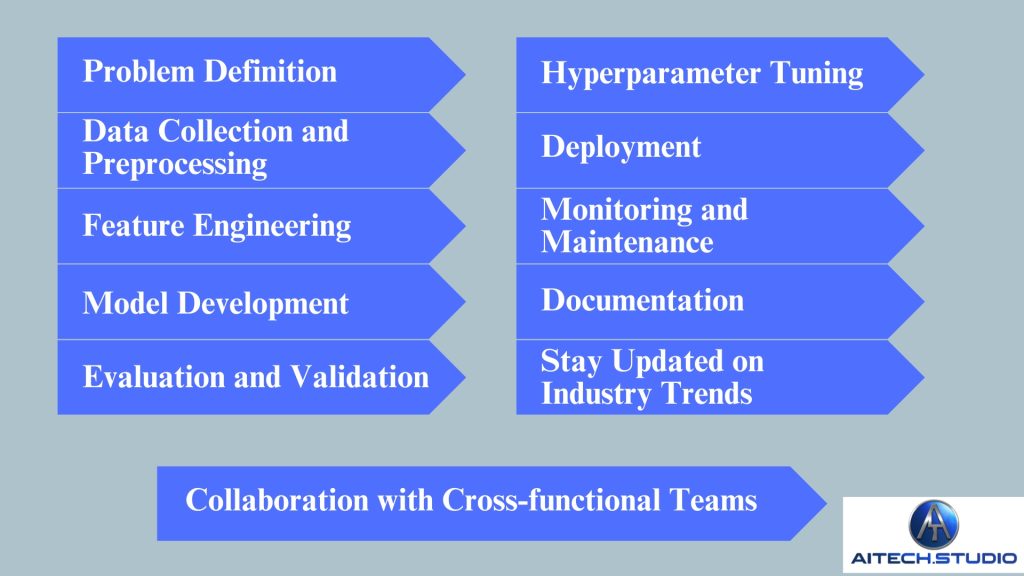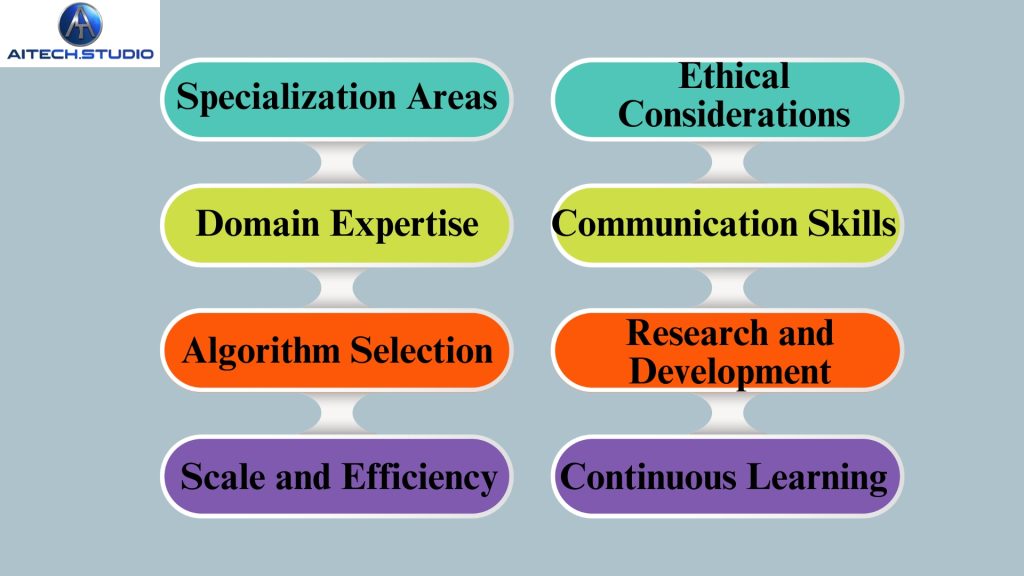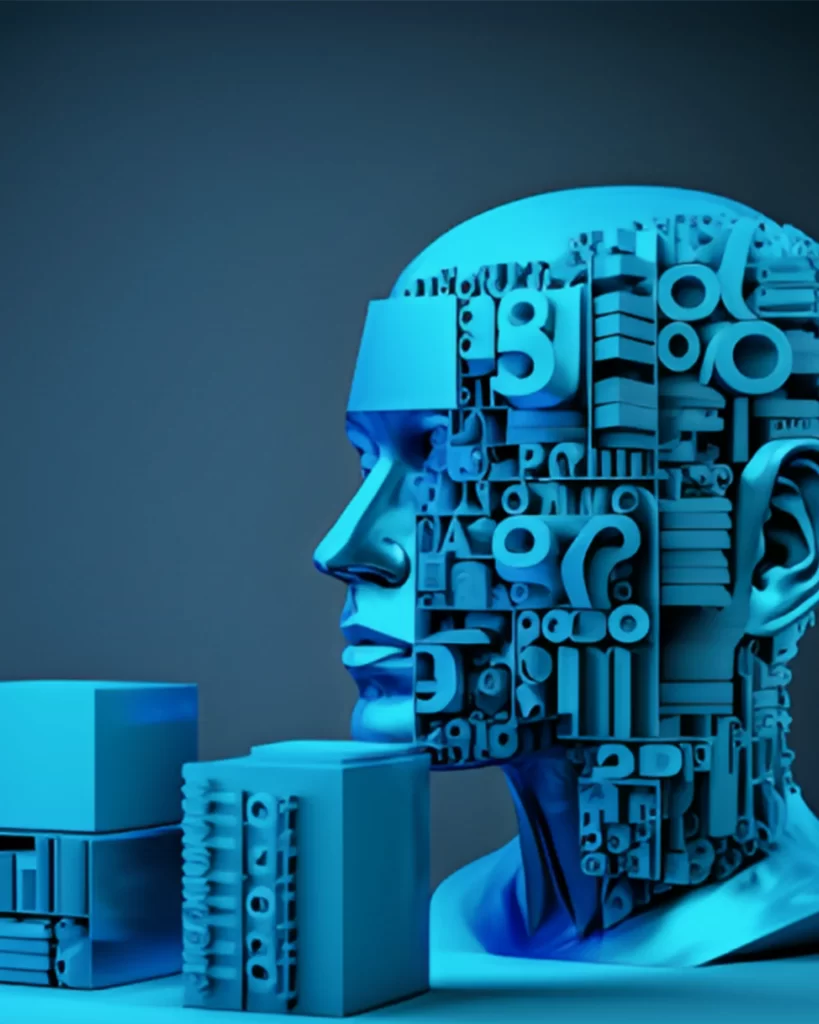Quick Victory: The Way of a Machine Learning Engineer:
In the ever-evolving realm of technology, a Machine Learning Engineer engages in a multidisciplinary approach, integrating concepts from computer science, statistics, and domain-specific knowledge. The primary focus of machine learning engineering lies in crafting and implementing algorithms that empower computers to acquire knowledge from data, enhancing their capabilities over time without the need for explicit programming.
Jackpot Ways Of Understanding: Machine Learning Engineering:
In the realm of machine learning engineering, practitioners work on designing, implementing, and optimizing ML models to solve real-world problems. This involves tasks such as data preprocessing, feature engineering, model training, evaluation, and deployment. The process is iterative, with engineers continuously refining models based on feedback and evolving datasets.
Machine Learning Engineering involves the creation, deployment, and optimization of algorithms that empower computers to learn from data, enhancing performance over time without explicit programming. It encompasses a holistic process, including data preprocessing, model training, evaluation, and iterative refinement based on feedback and evolving datasets.
Becoming a Machine Learning Engineer offers a compelling journey into a multidisciplinary realm, where professionals get to design, implement, and fine-tune models to solve real-world problems. The allure lies in the ability to leverage cutting-edge technology, contribute to innovative solutions, and play a crucial role in the evolution of artificial intelligence.
Machine Learning Engineering extends beyond just the development of algorithms; it also includes considerations of scalability, maintainability, and integration with existing systems. Successful machine learning solutions not only perform well on benchmark tasks but also seamlessly integrate into the larger software ecosystem.
In the ever-evolving tech landscape, the future of Machine Learning Engineering is characterized by several key factors. The abundance of data, coupled with the ability to automate and optimize tasks, positions Machine Learning Engineers as essential players in driving efficiency, personalization, and predictive analytics.
Importance of Machine Learning Engineers in Tech Today:
In today’s rapidly developing industrial environment, Machine learning engineers are pivotal in leveraging the abundance of data to drive innovation, automation, and competitive advantage across industries.
Several factors contribute to their significance:
- Data Abundance: With the exponential growth of digital data, organizations have access to vast amounts of information. Machine learning engineers play a crucial role in harnessing this data to extract meaningful insights, drive decision-making processes, and create innovative solutions.
- Automation and Optimization: Machine learning enables automation and optimization of complex tasks that were traditionally manual or rule-based. This leads to increased efficiency, cost savings, and improved overall performance across various industries.
- Personalization: Machine learning is instrumental in creating personalized user experiences. From recommendation systems in e-commerce to content curation in social media, machine learning engineers design algorithms that tailor services and products to individual preferences.
- Predictive Analytics: Machine learning models can analyze historical data to predict future trends or events. This capability is invaluable for businesses in making informed decisions, ranging from demand forecasting to financial planning.
- Innovation and Research: Machine learning engineers contribute to cutting-edge research and innovation. They explore novel algorithms, architectures, and techniques that push the boundaries of what is possible in artificial intelligence, fostering advancements in the field.
- Competitive Advantage: Organizations that successfully implement machine learning gain a competitive edge. Whether it’s in optimizing operations, understanding customer behavior, or developing new products, machine learning engineers are key players in driving innovation and staying ahead in the market.
In the ever-evolving tech landscape, the future of Machine Learning Engineering is characterized by several key factors. The abundance of data, coupled with the ability to automate and optimize tasks, positions Machine Learning Engineers as essential players in driving efficiency, personalization, and predictive analytics.
Machine Learning Engineer: Crafting Intelligent Solutions:
Machine Learning Engineers design, develop, and deploy machine learning models. Their core responsibilities include data preparation, model creation, programming, and deployment. They collaborate across teams, ensuring model performance, ethical considerations, and staying abreast of advancements. The role demands a blend of software engineering, data science, and continuous learning.
Key Responsibilities of a Machine Learning Engineer:
Machine Learning Engineers play a crucial role in the development and deployment of machine learning models. Their responsibilities span a wide range of tasks, combining expertise in software engineering and data science.
Their core responsibilities include:
- Problem Definition: Clearly define the business problem that the machine learning solution aims to solve.
- Data Collection and Preprocessing: Gathering relevant data for training and testing models, and ensuring data quality through preprocessing.
- Feature Engineering: Identifying and creating meaningful features from raw data to enhance model performance.
- Model Development: Designing, building, and training machine learning models using appropriate algorithms and frameworks.
- Evaluation and Validation: Assessing model performance using metrics relevant to the problem, and validating results to ensure generalizability.
- Hyperparameter Tuning: Optimizing model parameters to achieve the best performance on the given task.
- Deployment: Implementing models into production environments, considering scalability, efficiency, and real-time requirements.
- Monitoring and Maintenance: Regularly monitoring model performance in production, addressing issues, and updating models as needed.
- Collaboration with Cross-functional Teams: Working closely with data scientists, software engineers, and domain experts to integrate machine learning solutions into broader systems.
- Documentation: Maintaining clear and comprehensive documentation of the entire machine learning pipeline, including code, models, and processes.
- Stay Updated on Industry Trends: Keeping abreast of the latest advancements in machine learning, data science, and relevant technologies.

Epic ML Engineer Roles: Mastering the Ultimate Path:
Machine Learning Engineering roles encompass diverse aspects, reflecting the multidisciplinary nature of the field.
Some aspects of ML engineering roles include:
- Specialization Areas:
- Natural Language Processing (NLP)
- Computer Vision
- Reinforcement Learning
- Time Series Analysis
- Anomaly Detection
- Domain Expertise: Understanding the industry or domain for which machine learning solutions are being developed.
- Algorithm Selection: Choosing appropriate algorithms based on the nature of the problem (e.g., classification, regression, clustering).
- Scale and Efficiency: Optimizing models for large-scale deployment and ensuring efficient resource utilization.
- Ethical Considerations: Addressing ethical concerns related to data privacy, bias, and fairness in machine learning models.
- Communication Skills: Effectively communicating complex technical concepts to non-technical stakeholders.
- Research and Development: Engaging in research activities to explore new algorithms, techniques, and approaches.
- Continuous Learning: Embracing a mindset of continuous learning to adapt to evolving technologies and methodologies.
In summary, Machine Learning Engineers need a diverse skill set that includes technical expertise, domain knowledge, and effective communication to successfully contribute to the development and deployment of machine learning solutions.

Key Skills for a Successful Machine Learning Engineer
Key Technical Competencies for Machine Learning Engineers:
- Data Modeling and Evaluation: Data modeling involves creating representations of real-world processes or systems to understand and predict their behavior. Machine learning engineers must be adept at selecting and implementing appropriate modeling techniques. Evaluation skills are necessary to assess the performance of models, requiring a deep understanding of metrics like accuracy, precision, recall, and F1 score.
- Algorithm Design and Implementation: Algorithm design and implementation are fundamental skills for a machine learning engineer. This includes the ability to conceptualize, design, and implement algorithms that can efficiently solve complex problems. Strong algorithmic skills contribute to creating models that generalize well on new, unseen data.
- Machine Learning Algorithms: A comprehensive understanding of machine learning algorithms is essential. This encompasses supervised learning (where the model is trained on labeled data), unsupervised learning (dealing with unlabeled data), and other paradigms like reinforcement learning. A machine learning engineer should be able to select and apply the most suitable algorithm for a given problem.
- Mathematics (Linear Algebra, Calculus, Statistics): Machine learning is grounded in mathematical concepts. Linear algebra, calculus, and statistics are foundational for understanding algorithms and models. Linear algebra is crucial for operations on matrices, calculus for optimization problems, and statistics for interpreting data and making informed decisions.
- Data Science: Data science skills involve the entire pipeline, from data collection to model deployment. This includes data wrangling (cleaning and preprocessing), exploratory data analysis (EDA), and building predictive models. A machine learning engineer needs to be proficient in turning raw data into meaningful insights and actionable results.
MLE: Essential Programming for Software Engineering:
- Programming Languages Proficiency: A proficient machine learning engineer is expected to have expertise in programming languages such as Python, R, or Julia. These languages are commonly used in the development of machine learning models and their associated tasks. Python, in particular, is widely adopted due to its extensive libraries and frameworks, making it essential for data manipulation, model building, and deployment.
- Software Engineering: Software engineering skills are crucial for a machine learning engineer to develop scalable and maintainable solutions. This includes knowledge of software development principles, coding best practices, and version control systems like Git. Understanding how to write clean, modular, and efficient code ensures the robustness of machine-learning applications.
Machine Learning Engineer’s Essential Soft Skills:
- Communication and Collaboration: Effective communication is vital for a machine learning engineer. They need to articulate complex technical concepts to both technical and non-technical stakeholders. Collaboration skills are essential when working in interdisciplinary teams, as machine learning projects often involve close coordination with domain experts, business analysts, and other stakeholders.
- Problem-Solving and Critical Thinking: Problem-solving and critical thinking are core soft skills. Machine learning engineers encounter diverse challenges, from selecting appropriate algorithms to addressing data quality issues. The ability to approach problems analytically, think critically, and iterate on solutions is crucial for success in this field.
In summary, a proficient machine learning engineer possesses a balanced combination of technical and soft skills, enabling them to navigate the complexities of developing and deploying machine learning solutions in real-world scenarios.
Educational Background for a Machine Learning Engineer
ML Engineer Academics: Recommended Qualifications:
In the field of machine learning engineering, a solid educational foundation is crucial for understanding complex theories, algorithms, and applications. The recommended academic qualifications typically include a minimum of a Bachelor’s degree in a relevant field such as Computer Science, Mathematics, Statistics, or Electrical Engineering. Many employers prefer candidates with advanced degrees (Master’s or Ph.D.) for roles involving research and development.
- Bachelor’s Degree: A Bachelor’s degree provides fundamental knowledge in computer science, mathematics, and statistics. Courses in algorithms, data structures, linear algebra, and probability theory lay the groundwork for understanding the principles that underpin machine learning.
- Master’s Degree: Pursuing a Master’s degree offers a deeper understanding of machine learning concepts, algorithms, and their practical applications. Students can specialize in areas like artificial intelligence, data science, or machine learning engineering during their Master’s program.
- Ph.D.: For roles in advanced research or academia, a Ph.D. in a relevant field is often preferred. This level of education allows individuals to contribute significantly to the field through research, innovation, and the development of novel machine-learning methodologies.
Your Roadmap to ML Engineer: Relevant Degrees and Courses:
The courses and degrees that a machine learning engineer should consider are designed to provide a comprehensive skill set in theoretical foundations and practical applications.
- Foundational Courses:
- Algorithms and Data Structures: Understanding the fundamentals of algorithms and data structures is essential for optimizing machine learning models and algorithms.
- Linear Algebra: This mathematical discipline is crucial for understanding the mathematical underpinnings of machine learning algorithms, especially in areas like neural networks.
- Core Machine Learning Courses:
- Machine Learning Fundamentals: Courses covering supervised and unsupervised learning, regression, classification, and clustering are fundamental for any aspiring machine learning engineer.
- Deep Learning: Given the prominence of deep neural networks, courses focused on deep learning architectures, training, and optimization are crucial.
- Statistical Courses:
- Probability and Statistics: A strong foundation in probability and statistics is necessary for making informed decisions in machine learning, including understanding uncertainty and evaluating model performance.
- Specialized Courses:
- Natural Language Processing (NLP) or Computer Vision: Depending on the specific industry or application, engineers may opt for specialized courses such as NLP for language-related projects or computer vision for image processing tasks.
- Practical Application Courses:
- Data Science Projects: Courses that involve hands-on projects provide valuable practical experience, allowing students to apply theoretical knowledge to real-world problems.
In summary, a machine learning engineer’s educational background should include a combination of theoretical understanding and practical application. The recommended academic qualifications and relevant courses outlined above aim to equip individuals with the necessary skills to excel in the dynamic and rapidly evolving field of machine learning.

Machine Learning Engineers: Crafting Career Trajectories
Entry-Level Positions and Progression for ML Engineers:
Entry-level positions for machine learning engineers often require a solid foundation in computer science, mathematics, and machine learning concepts. Fresh graduates or individuals with minimal industry experience may start as:
- Junior Machine Learning Engineer: In this role, individuals typically work on implementing and maintaining machine learning models under the guidance of senior team members. They focus on coding, data preprocessing, and model evaluation tasks.
- Data Analyst/Engineer: Some professionals may begin their careers as data analysts or engineers, handling data processing, cleaning, and storage tasks. This role helps in gaining a better understanding of data, which is crucial for machine learning applications.
- Software Developer: Entry-level machine learning engineers may also start as software developers, writing code for various applications and gradually transitioning to integrating machine learning algorithms into software systems.
As one gains experience, progression within the field might lead to roles such as:
- Machine Learning Engineer: After gaining a few years of experience, individuals can transition into the role of a full-fledged machine learning engineer. Responsibilities include designing, implementing, and deploying machine learning models for real-world applications.
- Senior Machine Learning Engineer: With a proven track record, engineers may move into senior roles where they are involved in more complex projects, mentor junior team members, and contribute to the overall strategy of the machine learning team.
- Machine Learning Architect: This position involves designing high-level architecture for machine learning systems within an organization. Architects are responsible for making decisions about the overall structure and design of machine learning applications.
Specializations within Machine Learning Engineering:
Machine learning engineering offers various specializations that cater to different interests and skill sets. These specializations include:
- Data Scientist: Data scientists focus on extracting insights and knowledge from data using statistical analysis and machine learning techniques. They often work closely with machine learning engineers to develop models that can make predictions based on data patterns.
- Software Engineer: Some machine learning engineers specialize in software development, focusing on creating scalable and efficient software systems. They may work on developing the infrastructure for deploying machine learning models or integrating machine learning capabilities into existing software.
- Research Scientist: Individuals interested in advancing the field of machine learning may pursue a career as a research scientist. This role involves exploring new algorithms, methodologies, and approaches to solving complex problems in machine learning.
- Reinforcement Learning: Reinforcement learning specialists focus on creating systems that can learn from interactions with an environment. This is commonly used in fields like robotics, gaming, and autonomous systems, where the machine learns to make decisions through trial and error.
- Time Series Analysis: Time series analysis specialists concentrate on modeling and predicting trends over time. This specialization is crucial in financial forecasting, demand prediction, and any domain where data evolves with time.
Crafting Perfect Applications: Domain Mastery Unleashed
- Computer Vision: Machine learning engineers can specialize in computer vision, focusing on developing algorithms that enable computers to interpret and understand visual information from the world. This specialization is often applied in image recognition, object detection, and video analysis.
- Natural Language Processing (NLP): NLP specialization involves working with language data, enabling machines to understand, interpret, and generate human-like text. Machine learning engineers in this field contribute to applications such as chatbots, language translation, and sentiment analysis.
- Healthcare Informatics: In this specialization, machine learning engineers apply their skills to healthcare data, contributing to areas like predictive analytics, personalized medicine, and disease diagnosis. This field requires a deep understanding of healthcare data and regulatory compliance.
Cutting-Edge Technologies: Crafting Effective Tools
Machine Learning (ML) engineering involves the use of a variety of tools and technologies to develop, deploy, and maintain effective ML models. This section provides an overview of the key components used in ML engineering, including emerging technologies that are shaping the future of the field.
Overview of Tools Used in ML Engineering
Machine learning engineers leverage a multitude of tools throughout the entire ML lifecycle. These tools can be categorized into several key areas:
- Data Collection and Preparation:
- Python and R: These programming languages are fundamental for data manipulation, analysis, and model development.
- Pandas and NumPy: Libraries in Python for data manipulation and numerical operations, respectively.
- Jupyter Notebooks: Interactive environments for writing and running code, facilitating exploratory data analysis.
- Model Development:
- Scikit-learn and TensorFlow: Libraries providing a wide range of algorithms and tools for ML model development.
- Keras and PyTorch: High-level neural network APIs used for building and training deep learning models.
- XGBoost and LightGBM: Popular libraries for gradient boosting, often used for structured data.
- Model Deployment:
- Docker: Containerization tool to package and distribute ML models and their dependencies.
- Kubernetes: Container orchestration system for managing and scaling deployed ML applications.
- TensorFlow Serving and Flask: Frameworks for deploying and serving ML models in production.
- Monitoring and Optimization:
- TensorBoard: A visualization tool for monitoring and analyzing the training process of TensorFlow models.
- MLflow: An open-source platform for managing the end-to-end machine learning lifecycle, including tracking experiments and packaging code into reproducible runs.
- Prometheus and Grafana: Tools for monitoring and visualizing ML model performance in real-time.
- Collaboration and Version Control:
- Git: Version control system for tracking changes in code and collaboration among team members.
- GitHub and GitLab: Platforms for hosting and managing code repositories, enabling collaborative development.
- PyTorch
- PyTorch’s dynamic computational graph allows flexible model development with easy prototyping.
- The key for training neural networks, PyTorch’s automatic differentiation simplifies gradient computation during optimization.
- PyTorch supports a wide range of neural network architectures, providing pre-built modules for efficient implementation.
- PyTorch’s ecosystem, including TorchScript, facilitates a seamless transition from prototyping to production, crucial for machine learning engineers in model deployment.
Emerging Technologies in the Field:
As machine learning continues to advance, new technologies are emerging that shape the landscape of ML engineering. Some notable trends include:
- Explainable AI (XAI):
- LIME and SHAP: Tools for providing explanations of ML model predictions, enhancing model transparency and interpretability.
- Federated Learning:
- TensorFlow Federated (TFF) and PySyft: Frameworks for building machine learning models across decentralized devices while preserving data privacy.
- AutoML (Automated Machine Learning):
- Google AutoML and H2O.ai: Platforms that automate the process of model selection, hyperparameter tuning, and feature engineering, making ML more accessible to non-experts.
- Quantum Machine Learning:
- Qiskit and TensorFlow Quantum: Tools that integrate quantum computing capabilities into machine learning workflows, exploring the potential of quantum algorithms.
- Edge AI:
- TensorFlow Lite and ONNX Runtime: Frameworks for deploying ML models on edge devices with limited computational resources, enabling real-time processing without relying on cloud services.
- Cloud Computing Platforms:
- Amazon Web Services (AWS): Offers SageMaker, a fully managed service for building, training, and deploying ML models at scale.
- Google Cloud Platform (GCP): Provides AI Platform, allowing ML engineers to run distributed training jobs and deploy models effortlessly.
- Microsoft Azure: Offers Azure Machine Learning, a comprehensive set of tools and services for end-to-end ML workflows.
- Big Data Processing Tools:
- Apache Spark:
- Known for speed and ease of use.
- Supports both batch and stream processing.
- Integrates seamlessly with machine learning libraries like MLlib.
- Hadoop:
- Distributed storage and processing framework.
- Efficiently handles large-scale data.
- Consists of a Hadoop Distributed File System (HDFS) and MapReduce for parallel processing.
- Apache Spark:
In conclusion, staying abreast of the evolving landscape of tools and technologies is crucial for machine learning engineers. The dynamic nature of the field demands continuous learning and adaptation to leverage the latest advancements and deliver innovative solutions.
ML Engineer’s Workflow:
- Problem Definition and Data Collection:
- Problem Definition: Begin by clearly defining the problem you aim to solve. Understand the business context, identify the target variable, and define success metrics.
- Data Collection: Gather relevant data sources. This might involve querying databases, using APIs, or collecting data through sensors. Ensure data quality and relevance to the defined problem.
- Data Preprocessing and Cleaning:
- Data Cleaning: Address missing values, handle outliers, and correct errors in the dataset. This step is crucial for ensuring the quality of input data for training models.
- Data Transformation: Convert raw data into a format suitable for analysis. This involves encoding categorical variables, normalizing numerical features, and handling any skewness in the data.
- Feature Engineering:
- Feature Generation: Create new features that might enhance the model’s performance. This could involve combining existing features, extracting information from text or images, or creating interaction terms.
- Feature Selection: Identify and keep the most relevant features for model training. This helps in reducing dimensionality and improving model interpretability.
- Model Selection and Training:
- Algorithm Selection: Choose a suitable machine learning algorithm based on the nature of the problem (classification, regression, clustering) and the characteristics of the data.
- Model Training: Split the dataset into training and validation sets. Train the chosen model on the training set, optimizing hyperparameters to improve performance. Evaluate the model on the validation set to ensure it generalizes well to new data.
- Model Evaluation and Deployment:
- Evaluation Metrics: Assess the model’s performance using appropriate metrics (accuracy, precision, recall, F1-score). Fine-tune the model if needed.
- Deployment: Deploy the model into a production environment. This involves integrating the model into existing systems, setting up APIs, and ensuring it functions seamlessly in a real-world setting.
- Monitoring and Maintenance:
- Model Monitoring: Implement systems to continuously monitor the model’s performance in production. This includes tracking drift in input data, model accuracy, and system health.
- Maintenance: Periodically update the model to accommodate shifts in data distribution or changes in the problem domain. Address any issues that arise during deployment, such as software updates or changes in external APIs.
This comprehensive workflow ensures that machine learning engineers approach problems systematically, from defining the problem to maintaining models in real-world scenarios. Regular iteration and refinement are essential to keep the models effective and aligned with business goals.

Real-world Applications:
Machine learning (ML) has evolved from being a theoretical concept to a pivotal technology with diverse real-world applications across various industries. The integration of ML techniques has significantly impacted how businesses operate and make decisions.
Below are some key areas where machine learning is actively applied:
Machine Learning in Various Industries:
- Machine Learning in Healthcare: In the healthcare industry, machine learning is utilized for tasks such as disease prediction, personalized treatment plans, and medical imaging analysis. ML models can analyze vast amounts of patient data to identify patterns, enabling early diagnosis and more effective treatment strategies.
- Financial Services: In the financial sector, machine learning algorithms play a crucial role in fraud detection, credit scoring, and stock market prediction. These models analyze historical data, identify anomalies, and make predictions to support informed decision-making, ultimately improving risk management.
- Manufacturing and Supply Chain: ML is employed in optimizing manufacturing processes, predicting equipment failures, and streamlining supply chain management. Predictive maintenance models can anticipate when machinery is likely to fail, allowing for proactive maintenance and minimizing downtime.
- Marketing and Customer Service: Businesses leverage machine learning for targeted marketing campaigns, personalized recommendations, and sentiment analysis in customer service. These applications enhance customer engagement, improve satisfaction, and contribute to more effective marketing strategies.
- Autonomous Vehicles: In the automotive industry, machine learning is crucial for developing autonomous vehicles. ML algorithms process data from sensors and cameras to make real-time decisions, enabling vehicles to navigate safely and efficiently.
- Energy Management: ML is applied in energy sectors for optimizing energy consumption, predicting equipment failures, and improving the efficiency of power grids. Smart grid technologies, enabled by machine learning, enhance the reliability and sustainability of energy systems.
Impact of ML Engineering on Business Processes:
- Automation and Efficiency: ML engineering has revolutionized business processes by automating repetitive tasks and optimizing workflows. Businesses use ML to streamline operations, reducing manual intervention and improving overall efficiency. For example, natural language processing (NLP) models automate document categorization and data extraction.
- Decision Support Systems: ML engineering contributes to the development of robust decision support systems. These systems utilize advanced analytics and predictive modeling to assist decision-makers in making informed choices. ML-driven insights enable businesses to respond dynamically to changing market conditions.
- Business Intelligence and Analytics: ML engineering enhances business intelligence tools by enabling more accurate predictive analytics and data-driven insights. By leveraging ML algorithms, organizations can extract meaningful patterns from large datasets, facilitating strategic decision-making.
- Adaptability and Scalability: ML engineering allows businesses to create adaptable and scalable solutions. ML models can continuously learn from new data, adapting to evolving conditions and improving their performance over time. This adaptability is crucial in dynamic business environments.
In conclusion, the real-world applications of machine learning span various industries, bringing about transformative changes in business processes. ML engineering is instrumental in creating and deploying these applications, providing businesses with innovative solutions to complex challenges.
Challenges and Solutions
Machine Learning (ML) engineers often encounter various challenges in their work, ranging from data issues to algorithmic complexities. Addressing these challenges requires a combination of technical expertise, creativity, and strategic thinking. In this section, we will delve into common challenges faced by ML engineers and explore strategies and solutions to overcome them.
Common Challenges Faced by Machine Learning Engineers
- Insufficient or Poor Quality Data: One of the primary challenges in machine learning is dealing with insufficient or poor-quality data. ML algorithms heavily rely on high-quality data for training and generalization. Incomplete or inaccurate datasets can lead to biased models and poor performance.
- Solution: Data Preprocessing and Augmentation
- To overcome this challenge, ML engineers need to invest time in data preprocessing and augmentation. This involves cleaning and transforming raw data, handling missing values, and enhancing dataset diversity through techniques like data augmentation. By ensuring the quality and richness of the data, models can be trained to make better predictions on real-world scenarios.
- Overfitting and Underfitting: Overfitting occurs when a model is too complex and fits the training data too closely, leading to poor generalization of new, unseen data. On the other hand, underfitting happens when the model is too simple to capture the underlying patterns in the data.
- Solution: Regularization Techniques
- To address overfitting, ML engineers can employ regularization techniques such as L1 and L2 regularization. These techniques penalize overly complex models, encouraging them to generalize better on new data. Striking the right balance between model complexity and simplicity is crucial, and regularization methods help achieve this balance.
- Lack of Interpretability: Another challenge in machine learning is the lack of interpretability in complex models. Deep neural networks, for example, are often considered “black boxes” where understanding the decision-making process is challenging.
- Solution: Explainable AI (XAI) and Model Interpretability
- To enhance model interpretability, ML engineers can leverage Explainable AI (XAI) techniques. This involves using interpretable models or incorporating methods that provide insights into the model’s decision-making process. Techniques like feature importance analysis and model-agnostic interpretability tools help make ML models more transparent and understandable.
Strategies and Solutions to Overcome Challenges
- Continuous Learning and Skill Development: The field of machine learning is dynamic, with constant advancements and new technologies. ML engineers must engage in continuous learning to stay updated with the latest trends, tools, and algorithms.
- Solution: Attend Workshops, Conferences, and Online Courses
- To overcome this challenge, ML engineers should actively participate in workshops, conferences, and online courses. This allows them to gain exposure to emerging techniques, network with professionals, and enhance their skill set.
- Collaborative Teamwork: Machine learning projects often require interdisciplinary collaboration between data scientists, domain experts, and software engineers. Effective communication and collaboration are crucial for the success of ML projects.
- Solution: Foster a Collaborative Work Environment
- To address this challenge, organizations should foster a collaborative work environment. Cross-functional teams can facilitate effective communication, ensuring that ML engineers understand the domain-specific requirements, and domain experts grasp the technical aspects of the ML models being developed.
- Ethical Considerations: As ML models influence decision-making in various domains, ethical considerations become paramount. Bias in data or algorithms, unintended consequences, and privacy issues are common ethical challenges faced by ML engineers.
- Solution: Implement Ethical Guidelines and Audits
- To tackle ethical challenges, ML engineers should implement ethical guidelines during the development and deployment of ML models. Regular ethical audits can help identify and rectify biases, ensuring fair and responsible use of machine learning technology.
In summary, machine learning engineers must navigate various challenges, from data quality issues to ethical considerations. Adopting a holistic approach that combines technical expertise, continuous learning, and ethical considerations is crucial for building robust and responsible machine learning solutions.
Certifications and Training for Machine Learning Engineers
Machine learning engineering is a rapidly evolving field, demanding constant upskilling and adaptation. In this dynamic landscape, two key strategies become essential for success: recognized certifications and commitment to continuous learning. Let’s delve deeper into both, exploring their significance and potential pathways for your growth.
Recognized Certifications for Machine Learning Engineers:
In the field of Machine Learning (ML) engineering, obtaining recognized certifications is crucial for professional development and validation of skills. Here are some widely recognized certifications for Machine Learning Engineers:
- TensorFlow Developer Certificate: Issued by Google, this certification demonstrates proficiency in using TensorFlow, a popular open-source ML framework. It covers various aspects of building and training ML models, making it a valuable asset for ML engineers.
- AWS Certified Machine Learning – Specialty: Offered by Amazon Web Services (AWS), this certification validates skills in designing, implementing, deploying, and maintaining ML solutions on the AWS platform. It is particularly beneficial for ML engineers working with cloud-based solutions.
- Microsoft Certified: Azure AI Engineer Associate: This certification, provided by Microsoft, focuses on skills related to designing and implementing AI solutions on the Azure platform. It covers various AI services, including natural language processing, computer vision, and more.
- Certified Information Systems Security Professional (CISSP): While not exclusive to ML, CISSP is valuable for ML engineers working on projects involving sensitive data. It ensures a solid understanding of security principles, essential for deploying secure ML systems.
- Certified Machine Learning Engineer (CMLE): Offered by Google Cloud, CMLE is designed for professionals who build, deploy, and maintain ML models. It covers a wide range of ML concepts, algorithms, and tools, making it a comprehensive certification for ML engineers.
- Databricks Certified Developer for Apache Spark: Focused on Apache Spark, a popular distributed computing framework, this certification is beneficial for ML engineers dealing with large-scale data processing and analytics.
- Deep Learning Specialization (Coursera): Created by Andrew Ng, this specialization on Coursera provides a series of courses covering deep learning concepts. While not a traditional certification, completing the specialization demonstrates a strong foundation in deep learning.
Importance of Continuous Learning in ML Engineering:
Continuous learning is paramount in the ever-evolving field of ML engineering. Here’s why:
- Rapid Technological Advancements: ML technologies are advancing at a rapid pace. Continuous learning ensures ML engineers stay updated with the latest tools, frameworks, and techniques, enabling them to build cutting-edge solutions.
- New Algorithms and Models: Novel algorithms and models are constantly emerging. Staying current allows ML engineers to leverage advancements and apply them to solve complex problems more effectively.
- Industry Best Practices: Best practices in ML development, deployment, and maintenance evolve. Continuous learning ensures ML engineers adhere to industry standards, improving the quality and reliability of their work.
- Adaptation to Business Needs: Businesses’ needs change over time. Continuous learning enables ML engineers to adapt their skills and solutions to meet evolving business requirements, fostering professional growth and versatility.
- Enhanced Problem-Solving Skills: Learning from a diverse set of problems and solutions improves problem-solving skills. Exposure to various challenges enhances the ML engineer’s ability to design robust and efficient ML systems.
- Community Engagement: Active participation in the ML community through forums, conferences, and online platforms fosters collaboration. ML engineers can learn from others’ experiences, share insights, and contribute to the collective knowledge of the field.
In conclusion, obtaining recognized certifications and embracing continuous learning is pivotal for a Machine Learning Engineer’s success. These efforts not only validate expertise but also ensure adaptability and competitiveness in a dynamic and innovative field.

Industry Insights
In the rapidly evolving landscape of Machine Learning (ML) engineering, staying abreast of industry insights is crucial for professionals to navigate and contribute effectively. This section encompasses various facets of ML, providing a comprehensive understanding of the field.
Perspectives from Industry Experts:
This subsection delves into the invaluable insights offered by seasoned professionals and thought leaders in the ML domain. Industry experts bring a wealth of experience, having grappled with real-world challenges and witnessed the evolution of ML technologies. Their perspectives provide invaluable guidance for both novices and seasoned practitioners.
Elaboration:
- Expert Interviews: Conducting interviews with prominent figures in the ML industry can offer a firsthand account of the challenges they have faced and the strategies they employ.
- Case Studies: Analyzing case studies presented by industry experts allows for a deeper understanding of the practical applications of ML in different sectors.
Significance:
- Understanding the nuances of ML from those who have successfully navigated the industry can aid in crafting effective strategies and problem-solving approaches.
- Learning from the experiences of experts can help identify common pitfalls and best practices, contributing to a more robust ML engineering skill set.
Trends and Innovations Shaping the Future of ML Engineering:
The landscape of ML is marked by continuous innovation and dynamic trends. This subsection explores the cutting-edge advancements and emerging trends that are shaping the future of ML engineering.
Elaboration:
- Emerging Technologies: Examining technologies such as quantum computing, federated learning, and natural language processing, among others, provides insights into the expanding toolkit of ML engineers.
- Industry Adoption Trends: Understanding how different industries are embracing ML, from healthcare to finance, sheds light on the diverse applications and potential impact on business processes.
- Ethical Considerations: As ML technologies advance, addressing ethical concerns such as bias in algorithms and privacy issues becomes increasingly critical.
Significance:
- Staying informed about trends allows ML engineers to proactively incorporate new tools and methodologies into their skill sets.
- Awareness of industry-specific applications enables professionals to tailor their approaches based on the unique demands of different sectors.
- Recognizing and addressing ethical considerations ensures responsible and sustainable development in the field.
In conclusion, Industry Insights serves as a compass for ML engineers, guiding them through the complexities of the field by leveraging the wisdom of experts and staying attuned to the latest trends and innovations.
Resources for Deepening Your Expertise as a Machine Learning Engineer
Becoming a well-rounded machine learning engineer requires continuous learning and exploration. Fortunately, there’s a wealth of resources available to expand your knowledge and hone your skills. Here’s a breakdown of various avenues to fuel your growth:
Online Courses and Tutorials:
- Massive Open Online Courses (MOOCs): Platforms like Coursera, edX, and Udacity offer comprehensive, structured courses taught by world-renowned instructors. Popular options include Andrew Ng’s “Machine Learning” on Coursera and Sebastian Thrun’s “Intro to Machine Learning” on Udacity.
- Interactive Learning Platforms: Platforms like Kaggle Learn and Fast.ai provide interactive coding environments and project-based learning, allowing you to apply your knowledge immediately.
- Bootcamps: For an intensive learning experience, consider immersive bootcamps like Dataquest or Springboard. These programs offer concentrated training over weeks or months, often with career assistance services.
- Specialized Learning Resources: Platforms like Deeplearning.ai offer specialized courses focused on deep learning and specific ML subfields like Natural Language Processing (NLP) or Computer Vision.
Books and Articles:
- Classic Texts: Lay a solid foundation with foundational books like “Hands-On Machine Learning with Scikit-Learn, Keras & TensorFlow” by Aurélien Géron, or “The Elements of Statistical Learning” by Trevor Hastie, Robert Tibshirani, and Jerome Friedman.
- Advanced Publications: Stay up-to-date with the latest research through journals like arXiv and conference proceedings. Explore specialized books like “Deep Learning” by Ian Goodfellow, Yoshua Bengio, and Aaron Courville or “Speech and Language Processing” by Dan Jurafsky and James H. Martin.
- Blogs and Online Articles: Follow prominent ML engineers and researchers on blogs and platforms like Medium, Towards Data Science, and Lex Fridman Podcast. Engage with the online community through discussions and forums.
Conferences and Meetups:
- Attend industry conferences: Events like NeurIPS, ICLR, and CVPR bring together leading researchers and practitioners, offering talks, workshops, and networking opportunities.
- Local meetups and workshops: Participate in local meetups organized by AI/ML groups or meetup platforms. These provide a casual environment to share knowledge, get hands-on experience, and connect with fellow enthusiasts.
Online Communities:
- Active online forums and communities: Engage in discussions on platforms like Reddit’s r/MachineLearning or Google AI Discussion Board. These communities offer peer-to-peer learning, troubleshooting assistance, and valuable insights.
- Open-source projects: Contribute to open-source ML projects on GitHub. This provides valuable hands-on experience, collaboration opportunities, and the chance to learn from established developers.
- Mentorship programs: Seek out mentorship from experienced ML engineers through platforms like Kaggle Learn Mentorship or professional networks.

Conclusion:
Key Takeaways:
Understanding the role of a machine learning engineer reveals a profession of intricate responsibilities and diverse skill requirements. Serving as the linchpin in the development and maintenance of machine learning systems, these engineers undertake a range of tasks from data preprocessing to model deployment. Their role demands a comprehensive skill set that acts as a bridge between the realms of data scientists and software engineers.
Proficiency in programming languages, with a spotlight on Python, forms the foundation of technical skills for machine learning engineers. In addition, expertise in machine learning libraries such as TensorFlow or PyTorch is crucial. Equally indispensable is a robust mathematical and statistical background, coupled with a profound understanding of algorithms. These technical proficiencies collectively empower machine-learning engineers to craft effective and efficient machine-learning models.
The dynamic nature of the machine learning field underscores the importance of continuous learning. To stay relevant, machine learning engineers must keep pace with the latest advancements, algorithms, and tools. This commitment to perpetual learning is a defining trait, ensuring that their skills remain sharp and adaptable in the face of rapid technological evolution.
Beyond technical prowess, effective communication and collaboration skills emerge as paramount. Working within multidisciplinary teams, machine learning engineers must convey complex concepts to non-technical stakeholders. This necessitates seamless collaboration with data scientists, domain experts, and business leaders, highlighting the interdisciplinary nature of their work.
In navigating the ethical landscape, machine learning engineers must adopt a responsible and ethical approach. Addressing issues such as bias in data, fairness in algorithms, and the broader societal impact of their applications is crucial. Prioritizing ethical considerations ensures the development of trustworthy and inclusive machine learning solutions, emphasizing the profound societal implications of their work.
Encouragement for Aspiring and Current ML Engineers
Navigating the challenges and opportunities within the field of machine learning engineering requires a blend of resilience, curiosity, and strategic skill development.
- Embrace Challenges: Challenges are not roadblocks but stepping stones to growth. Aspiring and current ML engineers should approach difficulties as opportunities to expand their skill set, problem-solving capabilities, and overall professional development.
- Lifelong Learning: Committing to continuous learning is key. The rapid pace of technological advancement in machine learning necessitates a proactive approach to staying updated on emerging trends, tools, and methodologies. A commitment to lifelong learning is the foundation for sustained success in this dynamic field.
- Network and Collaborate: Building a strong professional network within the machine learning community is invaluable. Actively engaging with peers, attending conferences, and participating in online forums create opportunities for collaboration, knowledge sharing, and exposure to diverse perspectives.
- Contribute to Open Source: Active participation in open-source projects is a powerful way to enhance skills while contributing to the broader machine-learning community. Sharing knowledge, collaborating with peers, and contributing to open-source initiatives contribute to personal growth and the collective advancement of the field.
- Balance Technical and Soft Skills: While technical expertise is crucial, the importance of soft skills should not be underestimated. Effective communication, teamwork, and an awareness of the broader societal impact of machine learning applications contribute to holistic professional success.
In conclusion, the journey of a machine learning engineer is characterized by both challenges and fulfillment. By adopting a mindset of continuous learning, embracing challenges, cultivating a strong professional network, contributing to the community, and balancing technical and soft skills, both aspiring and current ML engineers can thrive in this dynamic and impactful field.
FAQs
1.What does a machine learning engineer do?
Machine learning engineers develop algorithms and models to enable computers to learn from and make predictions or decisions based on data.
2. What is required to become a machine learning engineer?
Becoming a machine learning engineer typically requires a strong foundation in mathematics, statistics, and computer science, along with proficiency in programming languages like Python and skills in data manipulation, machine learning algorithms, and model evaluation.
3. Is ML engineering a stressful job?
Machine learning engineering can be stressful due to the high demand for innovation, tight deadlines, and the need to continuously stay updated with advancements in the field. However, with proper time management and a supportive work environment, stress can be mitigated.
4. Is the machine learning engineer highest paid?
Machine learning engineers often command high salaries due to their specialized skill set and high demand in industries like tech, finance, and healthcare. While it’s among the well-paid professions, actual compensation can vary based on factors like experience, location, and company size.
5. Is ML a good career?
Machine learning offers a promising career path with opportunities for growth, innovation, and high earning potential. As the demand for AI and data-driven solutions continues to rise across industries, pursuing a career in machine learning can be rewarding for those passionate about technology and problem-solving.









